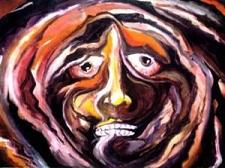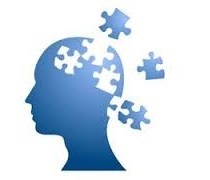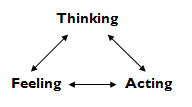 Cognitive behvioural therapy (CBT), sometimes called cogntive therapy, is a type of thereapy that focuses on how various factors within us and our environment interact with each other to to produce and maintain many issues that people struggle with such as anxiety and depression.
Cognitive behvioural therapy (CBT), sometimes called cogntive therapy, is a type of thereapy that focuses on how various factors within us and our environment interact with each other to to produce and maintain many issues that people struggle with such as anxiety and depression.
In CBT/cognitive therapy, we recgonize that, in addition to your environment, there are generally four components that act together to create and maintain anxiety: the physiological, the cognitive, the behavioural, and the emotional. These are described below.
The physiological component of anxiety involves physical symptoms and sensations such as:
- Increased heart rate; shortness of breath; tightness in chest
- Dizziness; weakness or tingling in your legs; feeling like you’re going to faint
- Muscle tension; tension in the face and head; headaches
- Lump in the throat
- Nausea or other discomfort in the stomach
- Feeling hot; sweating; sweaty palms; blushing
The cognitive component of anxiety involves thoughts and worries that often take the form of “What if …?” questions. These “What ifs” can be related to the anxiety-provoking situation:
- What if I fail?
- What if I embarrass myself?
- What if something bad happens to me or my partner/spouse/child?
- What if I don’t fit in and nobody like me?
- What if I have a panic attack?
The “What ifs” can also be related to the the physiological symptoms you’re experiencing:
- What if I have a heart attack?
- What if I pass out?
- What if I need medical attention?
- What if I don’t fit in and nobody like me?
 The behavioural component of anxiety can involve reduced performance due to the anxiety. If you’re focused on your worries or physiological symptoms, you might find yourself distracted, and so concerned with what’s going on in your mind and your body that you feel removed from the outside world. As a result, things that would be simple if it weren’t for your anxiety—such as a work-related task, or socializing—become much more difficult to perform.
The behavioural component of anxiety can involve reduced performance due to the anxiety. If you’re focused on your worries or physiological symptoms, you might find yourself distracted, and so concerned with what’s going on in your mind and your body that you feel removed from the outside world. As a result, things that would be simple if it weren’t for your anxiety—such as a work-related task, or socializing—become much more difficult to perform.
The emotional component of anxiety consists of emotions typically associated with anxiety such as fear, dread, panic. Anxiety can also lead to other emotions such as frustration, anger, disappointment, sadness and depression.






I am a functional trainer and my job involves public speaking, direct customer communication and delivering training to senior personnel in the organization. Although I feel confident of my skills and ability to communicate clearly, I’m always under a lot of stress and am anxious about my performance in front of a group of people; whether the faces are familiar or new to me. I believe that sometimes when I am able to take control of my emotions and my behavior, the cognitive and psychological factors make me anxious and stressed. I’ll constantly have to work upon in dealing with all these factors simultaneously.
Fantastic blog you have here but I was wondering if you knsw of any
fforums that cover the same toppics talked about in thios article?
I’d really like to be a pawrt of online community where I can get responses from other knowledgeable individuals that share the
sawme interest. If you have any recommendations, please let me know.
Thanks!
You could try the forums at forums.psychcentral.com